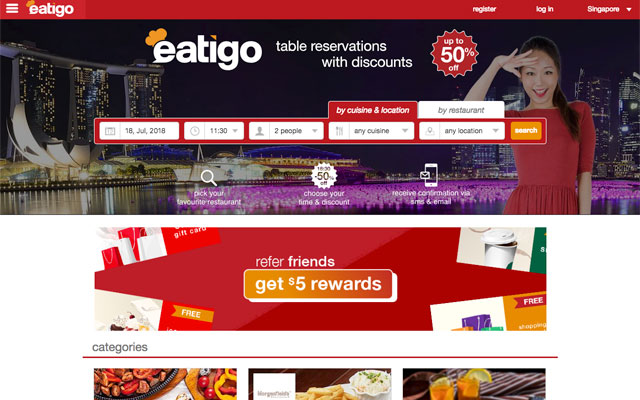Why TripAdvisor has a bigger appetite for South-east Asia’s Eatigo
18 Jul 2018
It now seats well over two million diners a month, stands out in the crowded online dining reservations space in Asia as a yield management platform for restaurants rather than just another marketing channel, and feels it is only scratching the tip of its full potential – reasons that give TripAdvisor a bigger appetite for Eatigo.
TripAdvisor, the largest investor in Eatigo, has invested a second round of funding in the startup. Eatigo was founded five years ago with a Series A investment by an unnamed big Thai media company. TripAdvisor entered in October 2016 in Eatigo’s Series B, bringing the total raise (Series A & B) to US$15.5 million. Speculation is it added just under US$10 million to bring the total investment to US$25 million to-date.

Bertrand Jelensperger, TripAdvisor Restaurants’ senior vice president, said: “Our continued investment in this company is a sign we are pleased with the progress that Eatigo is making as a business.”
That progress included Eatigo’s expansion last year into Hong Kong, the Philippines, Malaysia and India (through the acquisition of Ressy), from operating only in Singapore, where the company was incorporated, and Thailand, its operational headquarters. The four new markets represent over 50 per cent of Eatigo’s revenue and reservations, according to Eatigo’s co-founder and CEO, Michael Cluzel.
Eatigo is hungry to expand further in South-east Asia and the wider Asian region, extend its product offering, and is doing a full rebuild of all its platforms to offer “much better speed/loading times, search functionality, fully scalable and modular built that will allow us to add countries and services seamlessly for our smoothest user experience ever”, said Cluzel.
He won’t say which new markets Eatigo would go into. It aims to grow organically but is also open to “seize consolidation opportunities as and when they present themselves”.
When asked the number of seats a month it aimed to produce with further expansion, from the two million a month Eatigo was said to be doing currently, Cluzel said: “We can’t speculate on forward-booking numbers but historically, we have been doing three to four times (more) year-on-year every year since inception.”
While Singapore has Chope, Hong Kong OpenRice and China Dianping – household names in the respective local markets – Eatigo differs from those in that it offers time-based discounts of up to 50 per cent with no coupons required. Dining at an off-peak hour such as 21.30 may yield a 50 per cent off, compared with 30 per cent when dining at 18.00. A diner picks a restaurant, chooses the date, number of people, time and the discount offered by the merchant, and receives confirmation via sms and email.
Cluzel believes its model is what makes Eatigo competitive in the Asian marketplace and that the company is “still very much at the beginning of our journey, considering how inefficient merchants still are on capacity utilisation”.
Said Cluzel: “Hotels generally understand and appreciate our business model and have the highest satisfaction with the results. Eatigo is designed to help successful, popular merchants monetise their existing popularity in the most efficient way; we are not a marketing platform to help struggling merchants.
“Eatigo is a yield management platform, not a marketing platform. Yielding has been around since the 1970s, pioneered by American Airlines, and its sustainability has been amply demonstrated across industries such as airlines, hotels and car rentals.”
With Eatigo’s expansion, and TripAdvisor’s continued investment, chances of restaurateurs getting incremental business from travellers, aside from the bulk of locals, are also greater, players interviewed said. Travellers using TripAdvisor Restaurants or TheFork (which TripAdvisor acquired in 2014) could take advantage of the off-peak discounts in advance of their trips to the countries that Eatigo operates in. Indeed, Cluzel said Eatigo is seeing the percentage of cross-country bookings growing strongly, especially from markets like Hong Kong and Singapore into other markets.












